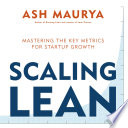

The Lean Startup methodology is central to the book and refers to a systematic approach to building a startup that emphasizes rapid iteration and validated learning. This methodology encourages entrepreneurs to build minimum viable products (MVPs) that can be tested in the market quickly. By doing so, startups can gather feedback and learn what works and what doesn’t without investing significant resources upfront. This iterative process allows for adjustments based on real customer feedback, ultimately leading to a product that better fits market needs. The Lean Startup methodology is not just about speed; it also focuses on reducing waste by avoiding unnecessary features and functions that do not provide value to customers. Entrepreneurs are encouraged to embrace uncertainty and view it as an opportunity to learn and adapt, rather than a hurdle to overcome.
Continue readingValidated learning is a core concept in 'Scaling Lean' that emphasizes the importance of learning through experimentation. This approach involves formulating hypotheses about what customers want, building MVPs to test these hypotheses, and then measuring the results to validate or invalidate them. The goal is to learn quickly and efficiently, allowing startups to pivot or persevere based on empirical evidence. This process helps entrepreneurs to avoid the common pitfall of building products based on assumptions rather than actual customer needs. The book illustrates how validated learning can be a powerful tool for decision-making, enabling startups to make informed choices that increase their chances of success.
Continue readingThe Build-Measure-Learn feedback loop is a fundamental component of the Lean Startup methodology. It involves three key steps: building a product, measuring its performance, and learning from the results. This loop encourages entrepreneurs to engage in continuous improvement by iterating on their products based on real-world data. The book stresses that the faster a startup can cycle through this loop, the quicker it can find a product-market fit. The feedback loop also promotes a culture of experimentation where failure is seen as a valuable learning opportunity rather than a setback. By embracing this iterative process, startups can refine their offerings and align them more closely with customer desires.
Continue readingIn 'Scaling Lean', the author discusses the concept of a growth engine as a crucial element for scaling a startup. A growth engine is a repeatable process that drives customer acquisition, retention, and revenue growth. The book outlines different types of growth engines, such as viral, paid, and sticky growth models, and explains how startups can identify and optimize their own growth engine. Understanding and leveraging a growth engine is essential for sustaining growth as the company scales. The author emphasizes that startups should focus on building a robust growth engine early on, as it will be instrumental in achieving long-term success.
Continue readingPivoting is an essential strategy discussed in 'Scaling Lean'. It refers to the process of making a fundamental change to the product or business model based on feedback and learning. The book emphasizes that pivoting should not be viewed as a failure but rather as a strategic move to enhance the likelihood of success. The author provides frameworks for identifying when to pivot and how to execute a pivot effectively. This includes analyzing customer feedback, market trends, and performance metrics. By understanding how to pivot effectively, entrepreneurs can adapt their strategies to better meet market demands and improve their chances of success.
Continue readingThe book also delves into the significance of establishing a sustainable business model. A sustainable business model is one that can generate consistent revenue and profit over time. The author outlines various components that contribute to a sustainable model, including value proposition, customer segments, revenue streams, and cost structure. Startups are encouraged to continually assess and refine their business model as they gather insights from their customers. This adaptability is crucial for long-term viability, especially in fast-changing markets. The book provides practical tools and techniques for entrepreneurs to evaluate and enhance their business models.
Continue readingFinally, 'Scaling Lean' highlights the importance of fostering a culture of innovation and experimentation within a startup. A culture that encourages risk-taking, creativity, and open communication can lead to groundbreaking ideas and solutions. The author discusses how leaders can create an environment where team members feel empowered to share their thoughts and test new ideas without fear of failure. This culture is critical for sustaining innovation and staying competitive in a rapidly evolving market. The book offers strategies for leaders to cultivate this culture, which can ultimately drive the startup's growth and success.
Continue readingThe reading time for Scaling Lean depends on the reader's pace. However, this concise book summary covers the 7 key ideas from Scaling Lean, allowing you to quickly understand the main concepts, insights, and practical applications in around 24 min.
Scaling Lean is definitely worth reading. The book covers essential topics including The Lean Startup Methodology, Validated Learning, The Build-Measure-Learn Feedback Loop, providing practical insights and actionable advice. Whether you read the full book or our concise summary, Scaling Lean delivers valuable knowledge that can help you improve your understanding and apply these concepts in your personal or professional life.
Scaling Lean was written by Ash Maurya.
If you enjoyed Scaling Lean by Ash Maurya and want to explore similar topics or deepen your understanding, we highly recommend these related book summaries:
These books cover related themes, complementary concepts, and will help you build upon the knowledge gained from Scaling Lean. Each of these summaries provides concise insights that can further enhance your understanding and practical application of the ideas presented in Scaling Lean.